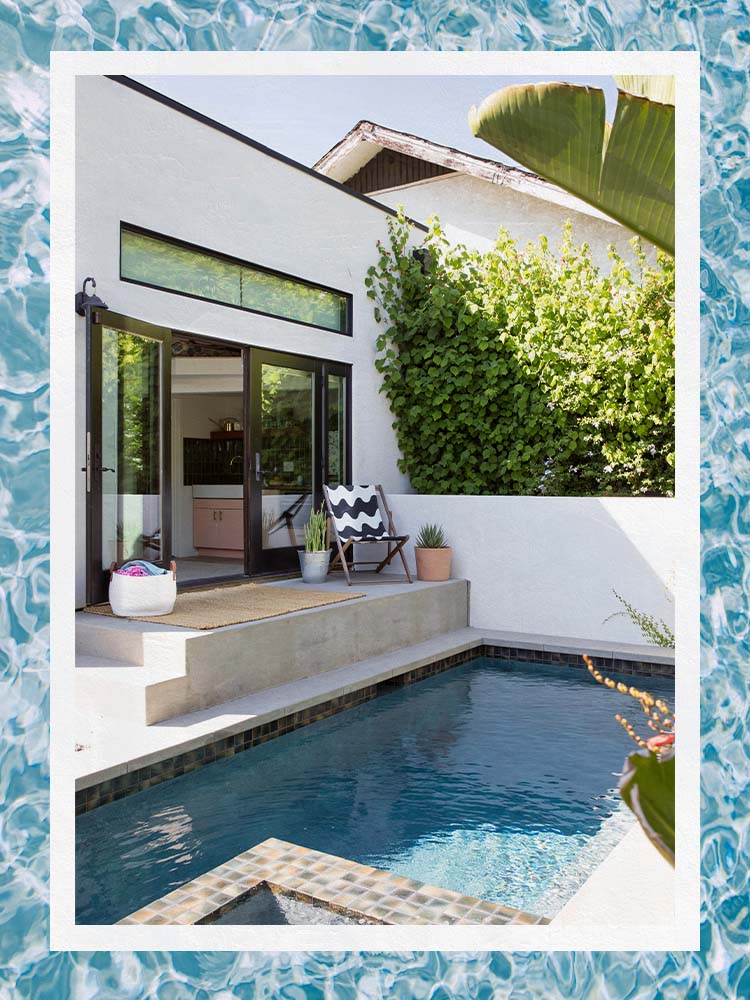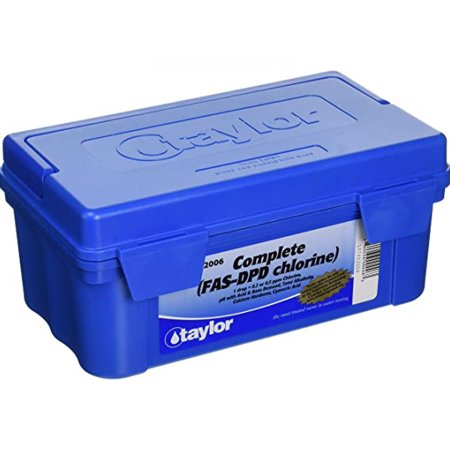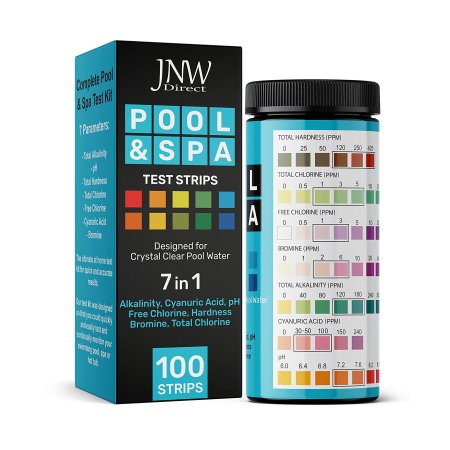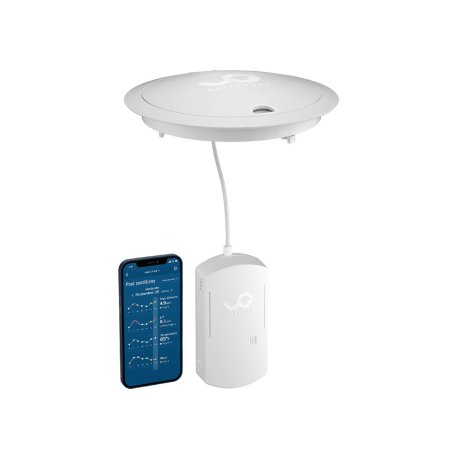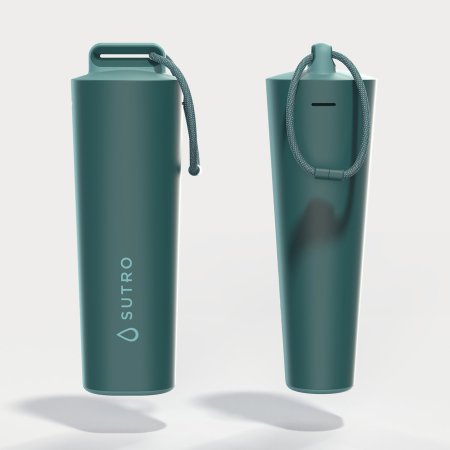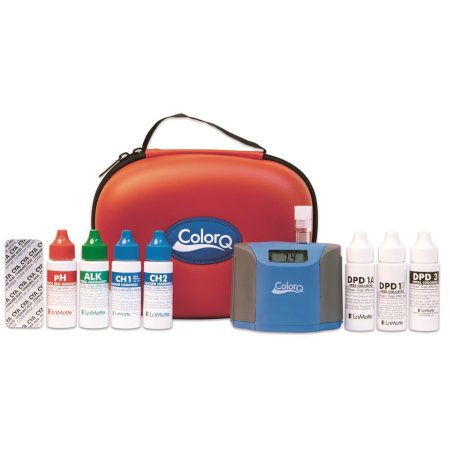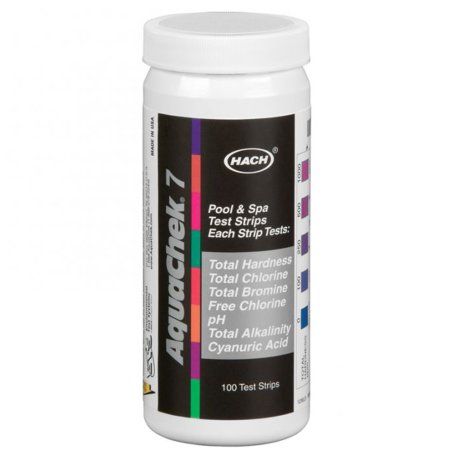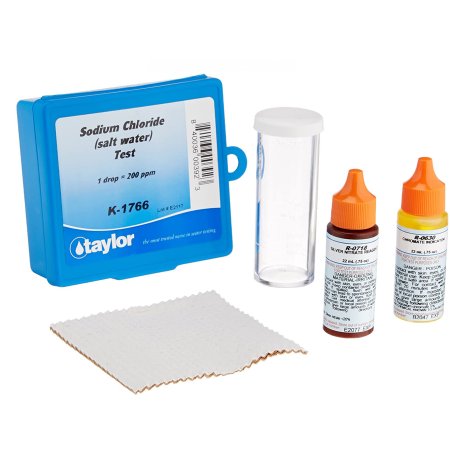We may earn revenue from the products available on this page and participate in affiliate programs.
Reading up on Domino’s shopping guides is like having your own personal product concierge. We do the tedious part—deep-dive research, hands-on testing, and tapping experts for advice—so all you have to do is hit “add to cart.” That’s why we call them Simply the Best.
At the end of a long, hot day, there may be few things more refreshing than taking a dip in the privacy of your own pool. But before diving in, you might want to check the clarity of that water first. Yesterday’s crystal-clear swimming session could have clouded into a milky blue haze overnight. And the culprit could be anything: Did you forget to shock it with chlorine, throwing the pH balance out of whack? Perhaps you thought it wouldn’t hurt to skip a few algicide treatments. Or maybe the situation is a bit subtler—the alkalinity levels could be off or your water might be too hard. But don’t pick up the phone to dial your local pool company just yet: Identifying the issue is as easy as investing in one of the best pool test kits.
Our favorites come in all forms, including simple strips for beginners and liquid drop shakers for well-versed owners. If you’d like to avoid conducting a full-blown science experiment before party guests arrive, we even found a few options that take a less hands-on approach, including one that will send treatment suggestions straight to your cell phone. Whether your main concern is worry-free maintenance, accuracy, or price, read on to figure out which of the seven best pool test kits is right for you.
Our Favorites
- Best overall: Taylor Technologies K-2006 Test Kit
- Best value: JNW Direct Pool and Spa Test Strips
- Best low-maintenance: WaterGuru Sense
- Best smart: Sutro
- Best digital: LaMotte ColorQ Pro 7 Digital Pool Water Test Kit
- Best all-in-one: AquaChek Silver 7-Way Test Strips
- Best salt water: Taylor Technologies Salt Water Chloride Drop Test
Best Overall: Taylor Technologies K-2006 Test Kit
Best Overall
Shop NowType: Liquid test kit | Tests for: Chlorine, pH, alkalinity, calcium hardness, cyanuric acid, bromine | Number of tests: 110
What we like:
- Allows you to conduct all the necessary water-quality tests
- Provides accurate results
- Carry case keeps all reagent bottles organized
Worth noting:
- Requires you to mix chemicals and match colors
Why we chose it: This kit is worth overcoming a learning curve.
No, Taylor Technologies’s test kit isn’t the easiest to use. You’ll need to measure out water samples, mix in reagents (the chemicals that help you perform tests), and match colors to determine the water quality of your pool—but it really gets the job done. At times it may feel like you’re back in chemistry class (and make you wish you’d paid more attention), but if you want the most accurate picture of water quality, this will ensure your pool remains crystal clear day in, day out with its ability to test for six different chemicals. The more you can test, the more data you’ll have to make any necessary changes to your pool’s chemistry.
Best Value: JNW Direct Pool and Spa Test Strips
Best Value
Shop NowType: Test strips | Tests for: Total chlorine, free chlorine, pH, alkalinity, water hardness, cyanuric acid, bromine | Number of tests: 100
What we like:
- Easy to use
- More affordable than other test options
- App provides recommendations based on test results (no guesswork needed)
Worth noting:
- Not as accurate as more expensive drop test kits
Why we chose it: A classic strip that tests for seven reagents—more than most other tests.
While JNW Direct’s test strips may not offer the precision of a chemical drop test, they’re still pretty precise and much more affordable, to boot. Plus compared to other strip offerings, which often only allow you to test for three or four water-quality data points, JNW Direct’s product conducts seven different measurements in a single strip. To use, simply dip the strip in the water, wait 15 seconds, then match the colors to the corresponding chart on the bottle. The brand also offers a handy app in which you can log and analyze your results to generate a few recommendations for what chemicals your pool needs to look and feel its best. Bonus: The app even includes a free e-book for those who really want to bone up on their pool chemistry.
Best Low-Maintenance: Water Guru Sense
Best Low Maintenance
Shop NowType: Smart | Tests: Free chlorine, pH, pool temperature, pump-flow rate | Number of tests: Unlimited
What we like:
- Doesn’t require a hub
- Sits out of sight inside the pool skimmer
- Daily measurements and results are delivered automatically
Worth noting:
- Only tests for free chlorine and pH.
Why we chose it: Effortlessly monitor your pool’s free chlorine and pH.
Out-of-sight, out-of-mind pool maintenance? Sign us up. The Water Guru hides in your pool skimmer thanks to a sensor that takes free chlorine measurements and assesses the water’s pH once a day. For those willing to pay for it, this test kit is the easiest way to track pool water conditions. It sends you push notifications, giving you an “okay” alert if all’s well; a “heads-up” alert if any of the pool’s chemical levels are a little off; or an “address now” alert if the levels are way off target and require your immediate attention. If imbalanced, the app will advise correcting chemicals along with other useful data points to ensure a safe swim, including water temperature and your pump’s current flow rate. However, there is a caveat: While the Water Guru makes testing a pool’s most crucial levels—ph and free chlorine—effortless, it won’t conduct other important water tests and requires a high up-front cost.
Best Smart: Sutro
Best Smart
Shop NowType: Smart | Tests for: Free chlorine, pH, alkalinity | Number of tests: 90 per cartridge
What we like:
- Delivers accurate readings multiple times a day
- Provides chemical recommendations to correct imbalances
- Takes water temperature
Worth noting:
- Expensive
- Requires hub to connect to the home network
Why we chose it: Never futz around with test strips or chemical drops again with this top-tier testing system.
Most pool tests require you to mix dyes and give samples a shake before attempting to match varying shades of the same color. It’s a tedious process, especially when you have to do it every single day. If you want to forgo all that, Sutro may just be the answer—but you’ll need to be willing to invest. This smart device consists of a canister-shaped unit, not too unlike an Alexa speaker, that floats in your pool (and won’t get caught in the skimmer). While the exterior is far chicer in appearance than the nearby thermometer, the magic happens on the inside, which hides a test cartridge that mixes reagents so you don’t have to, measuring your water’s free chlorine, pH, and alkalinity three times a day.
John Temple, manager of Tempool in Jacksonville, Florida, describes it as a top-of-the-line tester: “It’s extremely accurate and a good machine,” he stresses. You don’t even need to interpret the data, as Sutro will recommend any chemical additions you should make and send that straight to your phone. But automation doesn’t come cheap. Sutro’s price tag is steep, requiring a monthly subscription for replacement cartridges and chemical recommendations. “It might be a little bit out of the realm of possibility for the everyday homeowner,” says Temple.
Best Digital: LaMotte ColorQ Pro 7 Digital Pool Water Test Kit
Best Digital
Shop NowType: Digital | Tests for: Total chlorine, free chlorine, pH, alkalinity, water hardness, bromine | Number of tests: 120
What we like:
- Eliminates the guesswork by providing precise readings of reagent colors
- Easy to use
- Covers a broad range of data points
Worth noting:
- Requires you to mix reagents with water samples
Why we chose it: A built-in photometer is better than your personal perception of color.
If you’ve ever struggled to read the right hue of your water samples correctly, we know the feeling (honestly, it’s the hardest part). Lamotte’s digital test kit takes the guesswork out of color matching. You’ll still need to take water samples and add reagent solutions, but you won’t be holding tubes up to the sun to find the closest match to a guide sheet with varying hues of pink. This digital tester is equipped with a photometer that reads the water sample color for you, producing precise results. All you have to do is simply fill the vials with water, swirl the reagents around, and run the results through the tester. And yes, there are digital testers that work by simply dipping them in the pool water, but they aren’t as accurate as the ColorQ Pro 7 and won’t allow you to conduct as many tests.
Best All-in-One: Aquacheck Silver 7-Way Test Strips
Best All-In-One
Shop NowType: Test strips | Tests for: Total chlorine, free chlorine, pH, alkalinity, water hardness, cyanuric acid, bromine | Number of tests: 100
What we like:
- Provides 7 different readings
- Gives results in about 15 seconds
- Affordably priced
Worth noting:
- Not as accurate as a drop test kit
Why we chose it: Conduct seven different quality tests simultaneously without having to deal with reagents.
As aforementioned, most pool strips take only a few measurements, forcing an owner to purchase a more expensive drop test kit to collect the full slate needed to keep pool water in tip-top condition. AquaCheck’s test strips are an exception. Its strips provide seven different readings in one go. That’s the same amount of data you’d usually only expect from a drop test kit, but without mixing a single reagent. Simply dip the test strip into the water and get results in about 15 seconds. And while Aquacheck’s test strips may be more expensive than our value pick, they’re still much more affordable than most drop test kits and just as comprehensive.
Best Salt Water: Taylor Technologies Saltwater Water Chloride Drop Test
Best Saltwater
Shop NowType: Liquid drop | Tests for: Chlorine, pH, alkalinity, water hardness, bromine, salinity | Number of tests: 110
What we like:
- Tests for much more than just salinity
- Includes case for keeping the kit organized
- Affordably priced
Worth noting:
- Requires you to mix reagents with water samples
Why we chose it: This kit allows you to conduct all pool water quality tests, as well as the salinity of saltwater pools.
While a standard pool test kit will work with a saltwater pool, you likely won’t be able to detect the concentration of salt. Having the proper salinity in a saltwater pool is crucial to ensure it’s safe for swimmers and your pool’s hardware. Instead of working with multiple kits (and shelling out extra), a better option is to go with this kit, which allows you to test for salt along with everything else. Yes, it’s a lot of bottles to keep up with, but luckily this kit comes with a case to keep everything organized.
How We Chose These Products
Pool test kits vary in accuracy and the number of water quality tests they allow owners to conduct. And since pool tests serve as guides to tell you what chemicals you should add to your pool, precision is crucial. While a testing kit that requires you to mix chemicals may seem tedious, it may very well save you time and money in the long run, preventing you from not only purchasing but adding the wrong chemicals to your pool (and having to figure out how to right that wrong). With that in mind, we prioritized a kit’s accuracy and ability to conduct a broad range of tests over ease of use. In addition to accuracy, we considered budget and convenience. We included test strips that are affordable and reveal results in seconds, along with more expensive, high-tech smart test kits that will do all the hard work for you.
Our Shopping Checklist
Pool Test Kit Options
The best pool test kit for you is based on a few things: your comfort level with conducting water tests, your budget for test kits, and the time you have to commit to pool maintenance. (After all, pool water should be tested twice a week!) Our list consists of the most popular options:
- Test strips are the cheapest and fastest way to manually test pool levels, taking just seconds to gather results. However, they aren’t as precise as other methods and can be a challenge to read accurately, making it difficult to properly adjust your pool’s chemistry. Temple says water test strips are a great option for home use but suggests testing their accuracy: “I would test your water with the strip, then have a water sample tested at a local pool-supply store and compare the readings. This will show you how accurate the strip is going to be.”
- Drop test kits are more accurate. However, they are more expensive, and they require you to take small water samples, mix in reagents, and match the color of the sample to a guide. Temple says homeowners also have to be mindful of the shelf life of reagents and store them properly. “Drop test kits are good, but you have to remember that they age and are UV sensitive,” he says, suggesting storing them in a cool, dark place. Most reagents will expire after two years, so spending a lot of money for a kit with more reagents than you’ll use doesn’t make sense.
- Digital drop testers make this process easier by taking the guesswork out of color matching, but they are limited in what they can test for. Smart test kits are a great low-maintenance option, since these high-tech devices sit in a pool 24-7 and test the water up to two times a day. They can send results directly to your phone and even tell you what chemicals to add to fix any issues. However, they’re very expensive, and some require monthly subscription fees.
Water Test Types
If you don’t have past experience treating pools, deciding what a kit should test for can be overwhelming. Even the most basic kits will measure for free chlorine, or the amount of chlorine available in the water to sanitize a pool, and pH, which indicates how acidic or basic the water is. But many will also take alkalinity into account, which is the measure of alkaline substances in the water. Proper alkalinity is necessary to act as a stabilizer for the water’s pH.
Other measurements that separate the first-rate kit from an average one are calcium hardness, or the amount of dissolved calcium and magnesium in a pool (maintaining proper water hardness is crucial for preventing damage to the pool liner, pump, and filter). Cyanuric acid, which prevents chlorine from breaking down too quickly in the summer sun, is not as crucial but still important to test for, especially if your pool sits in indirect light all day; in other words, you’ll be constantly adding chlorine otherwise. Bromine, however, is only necessary if you’re using this sanitizer in place of chlorine (an option mainly for indoor pools and spas).
Use and Safety
While conducting water tests with pool test kits don’t present safety hazards, some of the chemicals you may need to add to correct your pool’s chemistry can be dangerous. Make sure you understand how to properly use each and use protection such as gloves and goggles when applying them to the pool.
Ask Domino
Q: I’m new to owning a pool. How do I balance pH?
You can balance the pH in your pool using a few methods. If the pH is too low, use either sodium bicarbonate (aka baking soda) or soda ash. Use baking soda if you need to raise your pH and alkalinity. Use soda ash just to raise your pH. How much you need to add depends on your pool’s volume and how much you require to increase the pH.
Q: Let’s hear the nitty-gritty. What should the chemical levels be in a pool?
Chlorine levels should be between 1 and 3 parts per million (ppm). If you’re using bromine instead of chlorine, shoot for between 2 and 6 ppm. Your pool’s pH level should range between 7.2 and 7.8 pH. Total alkalinity should range between 80 and 120 ppm. Calcium hardness should fall between 180 and 200 ppm, while cyanuric acid should range between 30 and 50 ppm.
Q: I have a saltwater pool. Should I be testing as often as I would for a regular swimming pool?
Test your saltwater pool’s pH and free chlorine at least once a week.
Q: How often should I be shocking my pool? And is it possible to add too much?
You should shock your swimming pool about once a week to keep the water free of contaminants and to prevent algae growth. And while shocking your pool is usually synonymous with cleanliness, using too much chlorine can also throw off the chemical balance of your pool. If this happens, the best solution is to wait for the shock to dissipate, which you can check on with a pool test kit. To speed up the process, removing the pool cover and allowing direct sunlight to hit the water can cause the chlorine levels to drop more quickly.
The Last Word
Unless you hire a service for regular maintenance, a good pool test kit is essential for ensuring that water chemistry is safe for swimming and your pool’s hardware. Select a kit that allows you to conduct free chlorine and pH tests several times a week. If possible, get a kit (or multiple kits) that lets you check on alkalinity, water hardness, and cyanuric acid at least once a month. Then dive in and enjoy the water.
